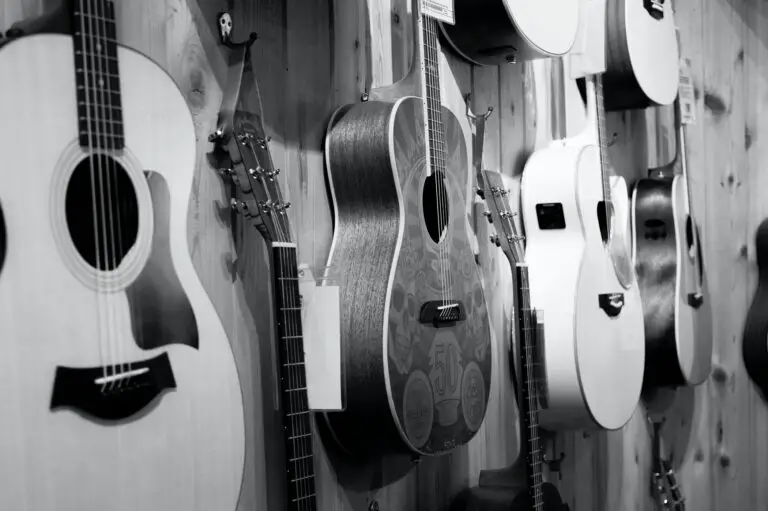The Differences Between Songwriters and Topline Writers
The music industry is full of a wide variety of creators and artists. Among these creators and artists, there are songwriters and topline writers, which are two unique types of lyricists. Although they are not the same, the things that set them apart may not be straightforward at first glance.
Still, what is the main difference between a songwriter and a topline writer?
Songwriters are responsible for creating a musical piece: they provide the melody, chords, and everything in between. On the other hand, a topline writer is hired to create lyrics or a catchy tune for a beat.
Despite their similarities, songwriters and topline writers perform different roles that carry out their responsibilities. However, other factors set them apart. Read on to learn more about the differences between songwriters and topline writers and what makes them unique.
Critical Differences Between Songwriters and Topline Writers
There are quite a few things that set apart topline writers and songwriters. Although they are part of the same industry, they are not the same. There are many differences, both big and small.
The most crucial difference is the definition. Without this, it is hard to set the two writers apart.
Defining Songwriter and Topline writer
There are two separate definitions and responsibilities for each of these careers.
Knowledge of these definitions might help an up-and-coming artist in the future of their career. Understanding whether a writer wants to be a songwriter or a topline writer is a critical item for them to establish before deciding on a career path to take.
What Is a Songwriter?
A songwriter is a musical creative, typically part of a band or group. Songwriters come to mind with traditional songwriting, meaning they are involved with the creative process. A songwriter will normally:
- Write the lyrics for a song
- Create chord progressions
- Layout the melody
Essentially, a songwriter creates the bare-bones structure for a song. In some cases, it will then be sold and picked up by another band, who will then bring it to life. A songwriter can also be a singer and run the entire operation.
What Is a Topline Writer?
Although topline writers create the song, they are involved less in the creative process and more in collaborating with others. A topline writer will:
- Write lyrics for an already made song
- Create melody over a fully formulated beat
- Collaborate with other writers and musicians in the creation of a full song
While a topline writer’s duties are critical, they are not as involved in creating the song as a general songwriter. They are the surface, while a songwriter is everything underneath as well.
A topline writer is just as important as a songwriter. They are vital in forming a catchy tune that will stick with audiences everywhere. A topline writer makes or breaks a hit song, especially for brand-new singers.
Rights
As there are different duties involved in being a songwriter or a topline writer, individual rights come with the job. These vary widely from each other in the lyrical world and may matter down the line.
The rights of a lyricist typically come down to the company that owns the song. Although these may vary, these are the rights that tend to be attached to each position. Each may shift in different situations and negotiations.
Rights as a Songwriter
As a creative who formulates everything in the song, from chords to lyrics, the song’s rights belong to the writer. Unless they sell it to a producer or a band, the songwriter possesses the rights to:
- The lyrics
- The melody
- The chords
A songwriter is the creator of much of the piece, so they hold tight to what they have created until they decide to give it up. This situation changes if the songwriter is under a contractual obligation or in the creative process with another individual or team.
Rights as a Topline Writer
A topline writer possesses a different level of rights in their creative process. They typically do not hold the rights to anything but the lyrics or melody they have created. This, too, can change if the artist has an active contract with any of the following:
- A producer
- Another songwriter
- A musician
Most of the time, a topline writer is only obligated to the lyrical rights while in the creative process. After that, the rights belong to the singer, band, or label. However, some more prominent topline writers have a greater pull.
Getting the Job
An artist goes about securing each of these creative jobs in different ways. These vary wildly in terms of preparation and process.
It is necessary to understand the various ways a lyricist might go about securing a lyrical position. It is a competitive industry and landing a contract or deal is hard work.
Becoming a Topline Writer
Though it is not required, a portfolio of lyrical masterpieces is good to have on hand at all times when seeking the position of a topline writer. This portfolio might consist of:
- Published songs
- Melodies created, both published and unpublished
- Previously written Lyrics that are both published and unpublished
- Songs that the artist collaborated on
All of these will help a record label or studio decide if they would like a specific creative or not. The portfolio must have pieces in the genre they want to write. A rock label, for example, would be less likely to hire a pop-based topline writer for their music.
A topline writer might also pitch their services on freelance sites or other creatives. They are in charge of making themselves known to singers, record labels, and executives. These industry professionals will then recommend them or push them further on their journey.
Becoming a Songwriter
The act of becoming a songwriter is a little more intense. You must polish the song before an artist can go out and sell the rights to their song. Once the lyrics and chords are perfect, a songwriter can:
- Pitch their song to up-and-coming artists
- Contact music publishers, record labels, and producers
- Record a demo to assist in the pitch
All of these methods have proven track records for songwriter success. It will likely not be successful on the first attempt. Becoming a published and sold songwriter takes persistence and hard work to break in. Record labels will listen if you have good work, but you must be willing to stick with it despite failure.
Contrary to popular belief, a songwriter doesn’t have to be a vocalist. You’ll find that big songs have a team of topline writers. Big names like BTS, Chris Brown, Bruno Mars, and Kanye West use topline writers in some of their tracks.
Creative Limitations
The limitations within the creative world of songwriters and topline writers are not the same. It is crucial to understand these differences as an artist before deciding to go in a particular direction.
Creative limitations restrict artists from taking certain liberties in their work. While some may find it obnoxious, they provide guidelines in a work environment to help writers create the right piece.
Creative Limitations as a Songwriter
As a songwriter, the limits on creativity are much less significant than that of a topline writer. Since the artist is essentially creating the song from scratch, the songwriter has free control over many components, which include:
- The words placed into the song
- The vocal melody
- Whom they choose to pitch or sell the song to
- The genre of the music
Of course, these freedoms may decrease if the songwriter is with a particular company or agency. However, if they are on their own, they have free control to alter and change these items as they please.
Creative Limitations as a Topline Writer
Topline writers are more constrained in terms of creativity. Since they work under someone as a writer, they:
- Must stay within requested genres
- Must work within a written beat or melody
- Must adhere to specified guidelines
A topline writer cannot be creative with the song’s genre or beat because they have already defined it. They can, however, be original with the lyrics and melody. This access is excellent for those who enjoy working creatively within a specified set of guidelines.
Copyright Necessity
A topline writer does not need to worry about copywriting their work. They generally work under a company, so the rights do not belong to them. This is not the same for a songwriter.
A songwriter should copyright their work before pitching it in any format. This copyrighting will protect them from any copycats that might try to take credit for the melody or lyrics that they have created. Without this copyright, the songwriter’s original work is at risk.
Original beat makers often do this if they have a killer track. Doing so will enable you to collect on streams and plays normally not given to you by less honest music industry members.
Job Progression With Experience
Often, a writer in the music industry will be both a songwriter and a topline writer at some point in their lives. These occur in the natural escalation of the musical life of a writer.
The progression may shift in different ways depending on where artists begin their careers. A songwriter will experience another change than someone who starts as a topline writer. However, there is a general method by which writers move through these two positions.
Songwriter to Topline Writer
Often, a lyricist new to the industry will begin their career creating everything independently. This dream start is ideal for a writer, which often cooperates with other companies as financial opportunities become available.
They will start as a:
- Songwriter, then move to be a topline writer
- Topline writer and increase in popularity as they move forward
- As a songwriter and make it big, which often comes when a writer can sing as well
In general, it is harder to make it right away as either of these creators. By creating every aspect of their songs, songwriters can build their portfolios.
Writers can then utilize this portfolio to build a career and future in toplining and creating lyrics with other artists. You can create personal work and handle your audio production, expanding your skillset.
Any studio experience (or experience in writing) helps grow your backlog. By doing many things, you can decide what works best for you.
Key Similarities Between Songwriters and Topline Writers
While it is crucial to know all the things that set these two careers apart, it is also just as critical to acknowledge what makes them similar.
In an artistic world where there are so many branches of each form of artistry, knowing what these two share in common will help solidify any confusion.
Staying on Top of Trends
Trends are critical when writing music in any format. A topline writer and songwriter must know what is popular now to increase their success chances. While outlier hits can happen, they are rare for up-and-coming writers and singers.
Some examples of trends over the years include:
- Latin Pop: With the popularity of “Despacito” by Luis Fonsi, music from Latin America has skyrocketed over the past few years
- K-Pop: K-pop has grown in popularity with bands such as BTS and Blackpink
- Hip-Hop: Hip-Hop has also risen due to the popularity of artists like Drake and Kanye West
A music industry member needs to understand what is in and out in the musical world. Doing so will reveal just what is on the market and allow you to break into a challenging world.
Freelancing Opportunities
Though you might work for a label or production company, many topliners and songwriters pursue their careers through the technique of freelancing.
Freelancers can:
- Work from home
- Select their pricing
- Work at their own pace
Freelance songwriters sell their work through a website, freelancing site, or word of mouth. Sales often depend on how popular a writer can make themselves, which takes time.
Freelance writers spend years building their careers before artists and companies come to them to offer them positions or one-off jobs for singers.
Of course, there are benefits to physically being in a location. Some record labels prefer seeing their employers. In-person also permits better communication and networking with music industry professionals.
The World of Music
One similarity between songwriters and topline writers is their involvement in the world of music. Together, songwriting and topline writing set the baseline for the world of creative lyrical writing.
Topline writers and songwriters both work with:
- Bands
- Producers
- Recording Studios
These connections with producers, bands, and studios allow them to help create music for the world and improve an industry that has existed for a long, long time.
The Creation of Music
Topline writers and songwriters have prime seats in the creation of music. They play a critical part in producing the product. They even get a say in the piece that results from all the work.
Writers are often the starting point for a piece of music. Without them, there is only a tune. While a melodic tone can be catchy, its collaboration with lyrics makes a song popular in any genre. Whether a topline writer or an independent songwriter, an artist who creates with words is crucial in the process. Both of them:
- Write catchy lyrics
- Create a popular melody
- Spend hours on audience research
A lot of time and effort goes into both of these writing styles—one is not lesser or greater than the other. Depending on your preferences, being a topliner or songwriter can be equally satisfying and fulfilling.
Require a Passion for Music
Both songwriting and topline writing are jobs that take an extreme level of work. If you are not passionate about lyrics and melodies, this job will be challenging. A creative person must be very confident in their work. This way, an artist can withstand even the most vigorous opposition on their journey.
Rejections are a common occurrence in this industry. Due to the influx of people attempting to make it into the music world as a full-time career, music labels must be selective with whom they choose as their partners. An incoming lyricist, whether a topline writer or a songwriter, must know that in the beginning, they will probably:
- Be turned down
- Lose their song due to lack of experience
- Compete with other lyricists for careers
Thanks to these and other factors, topline writers and songwriters must be committed and love what they are doing. It is critical to their success in the industry. Persistence is key to opening up doors further down the line.
Conclusion
Songwriting and topline writing sound like they would be the same thing, but they have many differences that set them apart from each other. Songwriting means taking everything into the artist’s hand, while topline writing gives the creative more guidelines in the creative process.
Both of these positions are exciting within the music industry. You can work with incredible individuals, write unique lyrics, and even become involved with later creative steps in the song.








